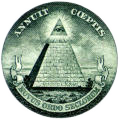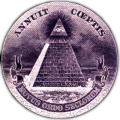One Nation, Under Many Gods
The Religious Beliefs of America's Founding Fathers —
in Their Own Words
The obelisk of the Washington Monument, our capital's soaring Egyptian Sun-shrine, is proof in marble that the USA is a Pagan as well as a Christian-Jewish-Muslim-Buddhist-Atheist nation. It's no coincidence that most of America's public architecture — our courthouses, capitol buildings, etc. — is modelled on classical Pagan temples, and not on Gothic churches, like the public buildings of Great Britain (which is an officially Christian nation). Anyone who takes the trouble to actually read about America's history, instead of just preaching their opinions about it, will discover that most of the Founding Fathers were religious radicals who didn't even belong to a conventional church.
Thomas Jefferson cut up the Bible to his own liking, and shared gibes about the absurdity of orthodox Christian doctrines with John Adams, a fellow Unitarian. Ben Franklin was a follower of Deism, an Enlightenment philosophy that is close to agnosticism. James Madison, the architect of the Constitution's separation of church and state, penned a famous protest against a Virginia state tax to support Christian clergy. George Washington was a Freemason — a devout member of a mystical order that traces its spiritual roots to the Pagan magic of ancient Egypt.
The following quotations from the writings of America's Founders provide plenty of proof that: "The government of the United States of America is not in any sense founded on the Christian Religion":
- "All men are equally entitled to the free
exercise of religion, according to the dictates of conscience."
— James Madison, 1776 - "The government of the United States of
America is not in any sense founded on the Christian Religion;
as it has in itself no character of enmity against the laws,
religion or tranquility of Musselmen [Moslems]."
— U.S. Treaty with Tripoli, 1797 (signed after the new nation's first naval victory, won against pirates in the Mediterranean) - "The Religion then of every man must be
left to the conviction and conscience of every man; ...
... it is proper to take alarm at the first experiment on our liberties. We hold this prudent jealousy to be the first duty of Citizens, and one of the noblest characteristics of the late Revolution. The free men of America did not wait till usurped power had strengthened itself by exercise, and entangled the question in precedents. They saw all the consequences in the principle, and they avoided the consequences by denying the principle. We revere this lesson too much, soon to forget it."
— James Madison, 1785. - "I do not believe in the creed professed
by the Jewish church, by the Roman church, by the Greek church,
by the Turkish church, by the Protestant church, nor by any church
..."
— Thomas Paine, 1793 - "The establishment of Civil and Religious
Liberty was the motive which induced me to the field; the object
is attained, and it now remains to be my earnest wish and prayer,
that the citizens of the United States would make a wise and
virtuous use of the blessings, placed before them."
— George Washington, 1783 - "I am a good deal in want of a House Joiner
and Bricklayer ... If they are good workmen, they may be of Asia,
Africa, or Europe. They may be Mahometans, Jews or Christian
of any Sect, or they may be Atheists."
— George Washington, 1784 - At Washington's funeral in 1799, the mourners threw sprigs of acacia into his grave, to symbolize the rebirth of Osiris. During his lifetime, his contemporaries noted that the Father of Our Country refused to take Christian communion. A Philadelphia minister who knew George and Martha Washington well, Rt. Rev. William White, wrote in his 1832 memoirs: "I do not believe that any degree of recollection will bring to my mind any fact which would prove General Washington to have been a believer in the Christian revelation."
- "I never will ... bow to the shrine of
intolerance, or admit a right of enquiry into the religious opinions
of others. On the contrary we are bound, you, I, and everyone,
to make common cause, even with error itself, to maintain the
common right of freedom of conscience."
— Thomas Jefferson, 1803 - "That I am not a member of any Christian
Church, is true ..."
— Abraham Lincoln, 1846 (nor is there any evidence that he ever joined one)
The above quotations are drawn from Gene Garman, America's Real Religion: Separation of Religion and Government in the United States of America, 1994. See http://www.sunnetworks.net/~ggarman/index.html.
![]() Return
to General Information.
Return
to General Information.
![]() Return
to Coven Oldenwilde's home page.
Return
to Coven Oldenwilde's home page.
This page last updated: 30 Jan. 2011







